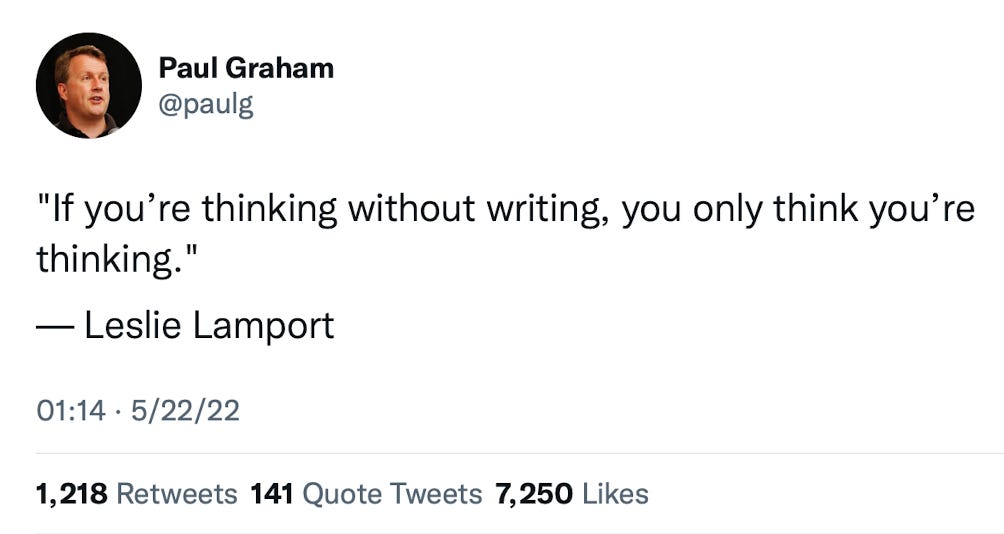On Writing
Words matter. A single word can throw you into the depths of despair or raise you to euphoria. Every significant civilization, culture, and religion has placed emphasis on them because words are how we create. Every idea starts with words which develop, grow, and materialize through the process of writing. Writing is fundamental to formalizing thoughts, communicating effectively, and is the ultimate creation tool.
Thinking Formalized
Writing is thinking formalized. We think and reason in words, so to think critically, you must write. Paul Graham, the founder of Y Combinator, has written at length on the power and necessity of putting ideas into words as a "severe test" to know something well. Graham also quotes Turing Award winner Leslie Lamport:
Writing well shows clarity of thought, but confusing, illogical, and verbose writing betrays poor thinking. Richard Guindon wrote "Writing is nature's way of letting you know how sloppy your thinking is."
Part of Amazon's success is credited to its culture of writing and Jeff's requirement for 6-pagers. Instead of Powerpoint presentations, detailed documents are required, which are read in silence at the beginning of meetings. Writing documents ensures deep thinking, thorough understanding, critical evaluation, and effective communication. Documents also level the playing field for meeting participants, so everyone starts with the same contextual foundation facilitating higher-quality discussions.
Writing at Spice AI
At Spice, we believe great writing is a reflection of clear thinking; and moreover the writing process helps create and crystallize that clear thinking. We infuse writing into everything we do, which started with the Spice AI vision, our first-principles, and includes the mission and strategy, customer discovery, problem-solution, product management, and engineering. Spice board meetings start with a board memo pre-read and discussion rather than a deck. And across the company we document major decisions using Spice Decision Records (SDRs), a version of ADRs, that extend beyond engineering.
Writing is leveraged throughout the customer-discovery and product creation process. This starts with written notes from Mom Test conversations, to using Amazon's Docs to define product vision and value proposition, which are iteratively tested with prospects and customers, providing distilled requirements for engineering, and creating clear messaging for customers and stakeholders.
Precison, concision, and structure are important, so writing doesn't have to take a lot of time. We start with simple templates that define the What or Goal-State of what we want to achieve, Why it should be prioritized, and By When. Here's the GitHub Issue template we use.
At Spice, writing is crucial in creating clarity, communicating effectively, and working as one team. A culture of writing ensures everyone is on the same page regarding goals, expectations, and plans. Great engineers are great communicators, a trait also recognized by other leaders like Paul Dix, CTO of InfluxData.
For those early in their careers, clear thinking is table stakes. As you rise in seniority, what you ultimately get paid for is making and communicating a small number of high-quality decisions. Writing well becomes even more important as you progress in your career, especially in teams like Spice, where communication and leadership (creating clarity) are core values. At Spice, everyone is expected to write well.
Writing in the age of ChatGPT
It's seductive to outsource your writing to AI, but if you do, your ability to think critically and create clarity for yourself and others will atrophy, along with your ability to create and forge your own destiny in the world. At Spice, while AI is encouraged for ideation and research, our guidance is to avoid using ChatGPT and other generative AI tools for writing as to maintain our critical thinking muscle. Some engineers take this even further and intentionally disable tools like GitHub Copilot when writing core or critical code.
Principles for writing
1. Audience. Be aware of, understand, and target a specific audience. Don't waste their time.
2. Clarity. Strive for clear, articulate, and straightforward expression. Be as specific, precise, and concise as possible. Remove all unnecessary words.
4. Narrative. Use narrative, story, or essay form, and avoid bullet-points except for specific lists.
5. Structure. Use structure to organize ideas coherently. E.g. write emails using the Inverted Pyramid structure.
6. Revision. Read, edit, and revise until the piece is as clear, precise, concise, and well-structured for the audience as possible.
Conclusion
Writing forces us to articulate ideas precisely which creates clarity. Through clarity we generate certainty - one of the 6 human needs. Through high certainty we can lead ourselves and others to do great things and ultimately create the world we desire.
Learning Resources
On Writing Well by William Zinger.
The Elements of Style by Strunk and White.
People's words and actions can actually shape your brain — TED Ideas.



